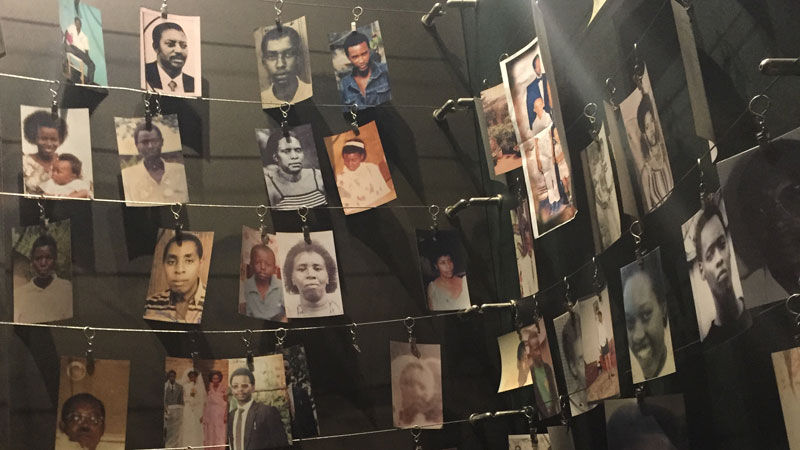Forum producer Irene Noguchi recently visited Rwanda on a fellowship with the International Women's Media Foundation and brought back this report on how radio is helping Rwanda leave behind its bloody past.

"Never again," reads a wreath at the Kigali Genocide Memorial Centre. This simple cement slab marks the mass graves of 250,000 victims. While Rwandans are encouraged to forgive perpetrators and focus on the future ("One Rwanda" and "We are all Rwandans" are popular refrains), the multiple memorial sites sprinkled across the country also ensure that they don't forget. There's even a 100-day memorial period that begins every year on April 7, the anniversary of the genocide, to remember the "100 Days of Slaughter" that ensued.

"Musekeweya" is a popular radio soap opera. It's a Romeo-and-Juliet-style story about two lovers from opposing villages who struggle to help their villages reconcile. While the names "Hutus" and "Tutsis" are never used, the message is clear: It's an allegory meant to instruct Rwandans to forgive past injuries, and work towards peace. The idea was started by a Dutch non-government organization called Radio La Benevolencija, which first used the model of peace-promoting radio in Sarajevo during the Bosnian War.
The actors record every Sunday – up to six actors at a time squeeze into the tiny recording booth, as the director cues them through the glass. They pound the walls with their fists for extra sound effects, and throw script pages onto the ground when they finish their lines.

Charles Rukundo is the head writer of "Musekeweya." He's also the drama coordinator, which means that the naturally soft-spoken Rukundo finds himself waving his arms and shouting directions at the actors through the recording glass. He's been working on the show for 11 years now, and it's a point of pride for him. "There are people who say, 'I can't miss [hearing] Musekeweya every Wednesday and Friday,'" said Rukundo. Polls show around 80 percent of rural villagers listen to the program. "Soap opera is our culture," said Rukundo.
"When people continue to listen, they think it's real life. They try to see what happens in the soap opera can also happen in society. So they change their behavior."

Getting people to change their behavior is the goal of many of these NGO-funded soap operas.
George Gahenda knows about the power of soaps. He is the managing director of Urunana Development Communication, which runs the "Urunana" show.
"Urunana" focuses on health. Its scriptwriters center plot lines around topics like AIDS prevention, domestic violence, sanitation, and clean drinking water. It's so popular, 74 percent of all of Rwanda tunes in every week. Its founders claim it has even helped the HIV infection rate drop from 11 percent to 3 percent.
When "Urunana" goes on the road for live performances, Gahenda says thousands of people will crowd the stage to peek at the actors. The crew grabs the chance to hand out prizes, including t-shirts labeled with messages to vaccinate children.

Claudette Benie, 22, and Nadia Umutaninano, 19, are part of a group of women training to be radio hosts and reporters by Ni Nyampinga, Rwanda's first teen brand. It's a radio show and magazine — made by teen girls, for teen girls — with the goal of defining women as doers and leaders in their communities. The magazine highlights women performing jobs typically held by men — like electricians, or motorcycle taxi drivers. And the radio show is written, edited, and hosted by girls, where its teenage hosts talk about everything from fashion and the hottest new bands, to once-taboo subjects like sexual harassment. The NGOs who fund Ni Nyampinga hope it will shift attitudes about gender equity, and change the way these young women view the world around them.

Clementine Barada is a radio producer who trains these young women. "Here in Rwanda, mostly there are men doing journalism," she said. "I think it's important to teach girls to learn about radio, about journalism, because they are young and they can change and they can compete with their fellow men."
Radio Rwanda airs Benie and Umutaninano's show every Friday at 6:45 p.m.
"My dream is to be an international journalist on BBC Radio," said Umutaninano. "I think one day I will get it."






